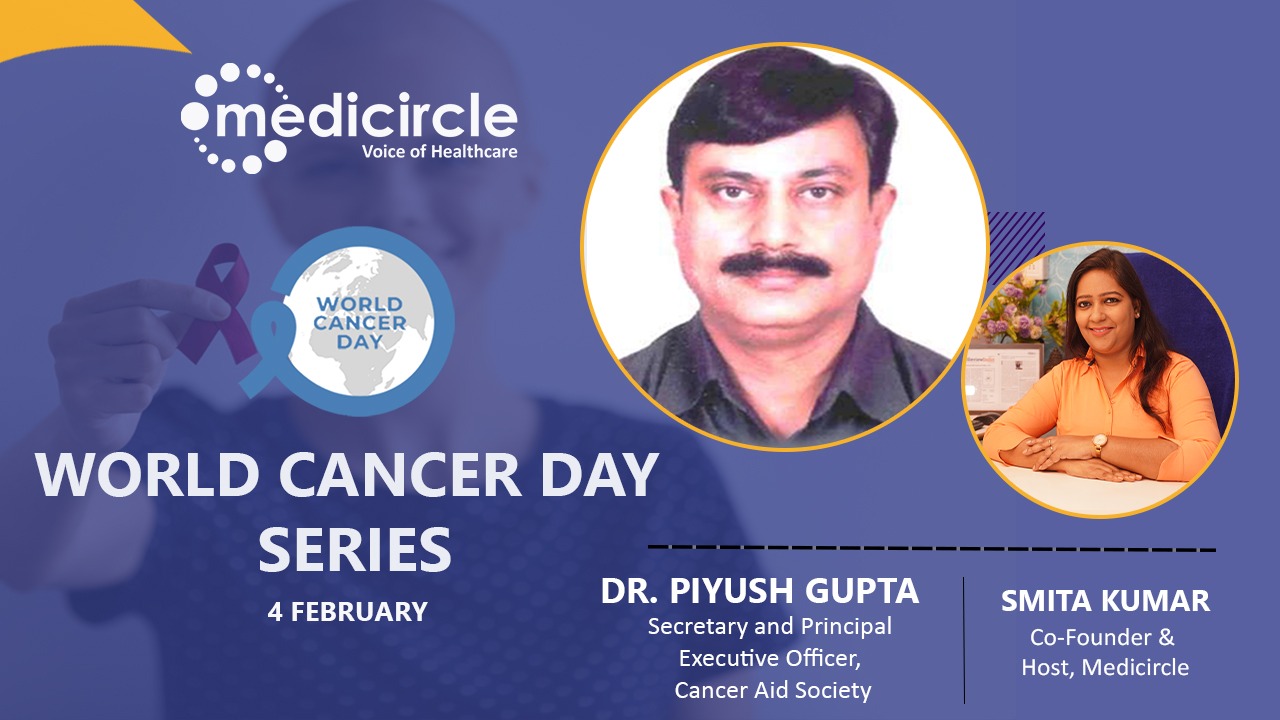10 million people around the world die each year from cancer. According to a recent report by the National Cancer Registry Program of India, the projected number of patients with cancer in India is 13, 92,1 79 for the year 2020 and the leading five common types of cancer are the ones that develop in breast, lung mouth, cervix uterus and tongue.
On the occasion of World Cancer Day, Medicircle is conducting a series of interview with eminent oncologists to spread awareness about cancer, its treatment and myths related to the disease.
Dr. Piyush Gupta, Secretary and Principal Executive Officer, The Cancer Aid Society, is a social worker and effective advocate on tobacco control, palliative care, prevention and control of cancer and non- communicable diseases. He is also the recipient of Trail of India award, and is an executive board member of various international and national organizations. He also serves as a secretary for the National Association of palliative care for AYUSH and integrative medicine.
The Cancer Aid Society is a 3 decade old NGO engaged in the fight against cancer and other non-communicable diseases which are killing 70% of the people globally.
Smoking and drinking are slow poison
Dr. Gupta explains, “Most people believe that since they have been smoking and drinking for many years and nothing has happened to them yet, nothing will happen to them in future as well. But what they fail to realize is that these are nothing but slow poison. Whenever the poison would exceed its limit, death is imminent. There are studies which show that once you start using tobacco, it’s not that there will be immediate effect, one could get diagnosed with cancer probably after 20 years of frequent tobacco usage. Youngsters who are abusing their bodies now with use of tobacco are going to get affected in a time-frame of 20 years when they would be middle aged, married and parent to small children. That is the time when people usually get diagnosed with cancer and die, leaving their families in the path of financial disaster. So, youngsters should understand that their addiction is going to lead to devastation of the entire family. It is high time that we start educating our younger generation,” he says.
We have to pay the price if we disturb the natural course of life
Dr. Gupta lists down the symptoms of cancer, “It may not be very evident in the beginning but later on they start getting more apparent when the disease starts developing further:
- Brain cancer or any brain tumor - Blurring eyesight, persistent headache, transitory blindness, complete or partial paralysis, dysfunction of some parts of the body.
- Cancer of the eyes - eyes become blood red, start protruding or bulging out.
- Cancer of the mouth - the opening of the mouth may decrease in size. Normally we can insert three fingers in our mouth, but in case of cancer of the mouth, the opening decreases. Other symptoms are - ulcer in the mouth, white or red patches within the oral cavity, difficulty in swallowing liquid or solid food items etc.
- Cancer of the larynx – Hoarse voice which is not getting cured within 15 days
- Cancer of the lungs - unexplained cough and presence of blood and sputum.
- Cancer of the liver or gallbladder - frequent nausea and vomiting, regular pain in the abdomen.
- Cancer of intestine - uncontrolled bowel, bouts of constipation and lose motion.
- Any wound which is not healing within a week or two, any mole which is changing shape, size, or color can turn out to be cancerous
If we disturb nature, it fights back. If we try to disturb the natural course of life, we have to pay the price for that. It is very common especially for the males to consume tobacco, which leads to lung cancer, poor genital hygiene in females leads to cancer of the cervix, many women prefer to marry late these days as they do not want to have children, this change in course of nature might result in breast cancer,” he says.
Proper palliative care would improve the quality of life
Dr. Gupta suggests that people should be made aware of palliative care, “Palliative care is focused on providing relief from the stress and symptoms of cancer. In due course, patients become miserable due to the various side-effects for e.g., they might develop smelly bed sores, however, due to lack of knowledge about palliative care, they have to suffer a lot. Proper palliative care would improve the quality of life of the cancer patients and add an additional layer of support,” he says.
(Edited by Amrita Priya)

 “Youngsters are getting drawn towards the glorification of certain behaviors like tobacco use and visits to hookah bars but they must understand that these are going to make them and their families miserable in the long run,†says Dr. Piyush Gupta, Secretary and Principal Executive Officer, The Cancer Aid Society.
“Youngsters are getting drawn towards the glorification of certain behaviors like tobacco use and visits to hookah bars but they must understand that these are going to make them and their families miserable in the long run,†says Dr. Piyush Gupta, Secretary and Principal Executive Officer, The Cancer Aid Society.




.jpeg)
.jpeg)
.jpeg)

.jpeg)
.jpeg)
.jpeg)








.jpeg)



.jpg)



.jpg)


